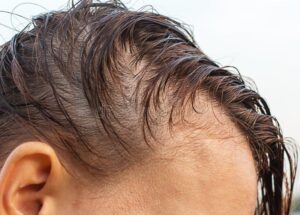Hair loss is a distressing symptom of menopause, and it can lead to low confidence. I will look at the causes, offer some natural solutions and homeopathic remedies for you to consider.
Some women notice that their hair becomes thinner or patchy at menopause. For most women, it’s not as dramatic for most women as for male hair loss, but it can be a very sensitive subject that can affect confidence. Most women experience overall hair thinning rather than noticeable bald spots. The thinning can occur on the front, sides, or top of the head. Hair may also fall out in large clumps during brushing and showering.
Why do we lose hair during menopause?
Hair loss during menopause is the result of a hormonal imbalance. Specifically, it’s related to a lowered production of oestrogen and progesterone. These hormones help hair grow faster and stay on the head for longer periods. When the levels of oestrogen and progesterone drop, hair grows more slowly and becomes much thinner. A decrease in these hormones also triggers an increase in the production of androgens (a group of male hormones). Androgens shrink hair follicles, resulting in hair loss on the head. In some cases, however, these hormones can cause hair to grow on the face.
Hormone change is the leading cause of hair loss for women in midlife. Other factors can also lead to hair loss for women during menopause. For example, high-stress levels, poor nutrition, lack of exercise, inadequate hydration and insomnia can contribute. Diagnostic blood tests that can help rule out other causes of hair loss include thyroid tests for an underactive thyroid.
Book 15 minutes free now to find how homeopathy can help you.

Simple steps for you to consider
- Nutrition
Eating a balanced diet is your best defence against hair loss. Ensure you include good whole grains, fruits, vegetables, and proteins in every meal. Consider consulting a nutritionist to see if you might be deficient in specific nutrients vital to hormone balance and hair health, such as vitamins, Zinc, Omega-3 fatty acids. Look for foods high in those and try to include them in your diet. Drink plenty of water to stay hydrated, avoid sugary drinks. Aim for 1.5 to 2 litres of water a day.
- Reduce stress
It’s essential to keep your stress levels in check to prevent a hormonal imbalance. Hormonal changes at menopause can affect brain chemistry and cause mood swings, anxiety, and depression. However, doing yoga and other breathing relaxation methods are especially effective in fighting menopausal symptoms. Exercising on a regular basis can also help reduce stress.
- Keep it natural
To prevent drying and breakage of your hair, it is best to stay away from heat tools, such as hairdryers and straighteners. Extensions and other styling methods can also weaken your hair and cause early hair loss. If you must dye your hair, choose an all-natural hair colour. Artificial chemicals found in dyes and perms can compromise your scalp and hair health. When you wash your hair, use natural shampoos and conditioners. It may be a good idea to use a natural nourishing mask once a week or as often as needed.
If you swim, make sure to wear a swimming cap, as chlorine can contribute to hair breakage. When out in the sun or the wind for extended periods, it’s essential to wear a hat to protect your hair from drying and breakage.
- Get enough sleep
Sleep helps all our bodily functions and allows the body to build, repair and restore. Have a calming bedtime routine such as a lavender bath, avoid stress and technology before bed, and sleep in a darkened room. Healthy sleep will help to rebalance hormones and nourish the adrenal glands. The adrenals are the glands that produce stress hormones like cortisol and sex hormones during menopause.
- Medications
Some medications have side effects that include hair loss. Talk to your doctor if you are experiencing significant hair loss and think that is connected to your medications. Your doctor might be able to switch you over to another type of medicine without side effects affecting the hair.
Homeopathy for hair loss during menopause
To support the hair on a cellular level often Tissue salts are recommended. The combination K, which contains Kali sullph, Nat. mur, and Silica in 6x potency and is taken four times a day, is the one that is used the most. Sometimes, a combination of all tissue salts is better in some cases where there may be problems with absorption or nourishment.
Homeopathy is a holistic form of medicine. When a homeopathic remedy fits the person’s symptoms, it will help to resolve a wide variety of symptoms, including hair loss. The key is the remedy to be similar to the patients’ symptoms. I choose the best treatment for my clients after 90 minutes of consultation for new patients or after follow-up consultation for my existing clients.
A big hormonal remedy with a symptom of hair loss during menopause is Sepia. This remedy suits people that are exhausted from too many obligations, feel indifferent to their loved ones and may have low libido.
Other homeopathic remedies indicated for ‘falling out of hair from the head’ are Barita carb, Phosphorus, Silica, Zink.
Sometimes remedies made from hormones are considered like Progesterone, Oestrogen, Testosterone.
For best results and individualised treatment of your menopausal symptoms, I recommend that you consult a qualified homeopath. The homeopathic treatment is holistic and will involve all of your symptoms.
Interested to know more about homeopathy and how it can help with hair loss and other menopausal problems?
book 15 min freeDisclaimer: This article is for educational purposes only and not intended to replace the advice of your physician or health care provider.
